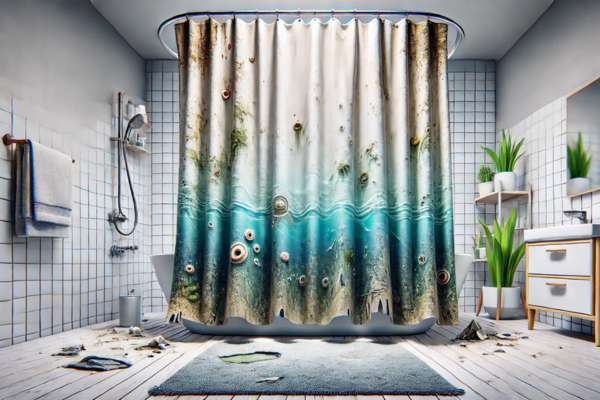Wondering how long shower curtains typically last?Shower curtains are crucial for maintaining your rest room tidy and including a hint of fashion, but their durability can vary primarily based on substances, utilization, and renovation. Generally, a standard shower curtain made from vinyl or polyester can last anywhere from six months to a couple of years with proper care. However, frequent exposure to moisture and soap residue can shorten its lifespan. Knowing the factors that impact a showers curtain’s longevity can help making a decision when it’s time for an alternative. In this manual, we’ll discover the lifespan of different kinds of bathe curtains, signs and symptoms that it could be time for an upgrade, and recommendations to assist make their life bigger so you can preserve your toilet searching sparkling.
Understanding The Average Lifespan Of Shower Curtains

While there’s no definitive rule on the lifespan of a shower curtain, the average lifespan typically ranges from six months to a year. Showers curtains made from plastic or vinyl, for example, tend to have a shorter life expectancy due to their tendency to trap moisture and develop mildew. In contrast, fabric shower curtains can last longer, especially if they’re made from durable materials like polyester or treated with water-resistant coatings. Ultimately, how long a showers curtain lasts depends on the material, usage, and care it receives over time.
Types Of Shower Curtains And Their Durability

Not all shower curtains are created equal. There are various types, each with its strengths and weaknesses regarding durability.
1. Plastic Showers Curtains: These are often the most affordable but tend to wear out quickly, especially when frequently exposed to moisture and soap scum.
2. Vinyl Showers Curtains: Slightly more durable than plastic, vinyl curtains resist mildew better, but they may stiffen or discolor over time.
3. Fabric Showers Curtains: Made from materials like polyester, cotton, or linen, fabric curtains are typically more resistant to wear. Cotton is absorbent, however, and may require more frequent washing to prevent mildew.
4. Polyester Curtains: Polyester offers a good balance between durability and water resistance, making it a popular choice for those looking for a fabric curtain with more resilience.
Factors That Affect The Durability Of Shower Curtains

Several elements influence how long a shower curtain lasts. Understanding these factors can help you better gauge when it’s time for a replacement.
1. Material Quality: Higher-quality materials often withstand wear and tear better than cheaper ones. This includes both the fabric and any waterproofing treatments applied to it.
2. Exposure to Water and Humidity: Bathrooms are naturally humid environments, and moisture can speed up deterioration, especially for absorbent materials.
3. Sunlight Exposure: Curtains in bathrooms with natural light may experience fading or weakening of fabric over time due to UV exposure.
4. Frequency of Cleaning: Regular cleaning removes mildew and soap scum that could otherwise degrade the material, but over-scrubbing can lead to wear as well.
Signs Your Shower Curtain Needs Replacing

Knowing when to replace a shower curtain isn’t always obvious. However, several signs can indicate it’s time for a refresh.
1. Mildew or Mold Growth: If mildew or mold becomes persistent, even after regular cleaning, it’s a sign the curtain has reached the end of its lifespan.
2. Tearing or Fraying: Fabric showers curtains may fray at the edges, while plastic or vinyl curtains can develop small tears or punctures.
3. Stubborn Stains: Some stains may embed too deeply over time, making them impossible to remove. Persistent staining not only looks unattractive but can also harbor bacteria.
4. Discoloration: Sunlight or cleaning products can cause certain materials to yellow or fade, indicating wear.
Ways To Extend The Life Of Your Shower Curtain

By taking some proactive measures, you can significantly extend the lifespan of your showers curtain.
1. Regular Washing: Fabric curtains can often be machine-washed, which helps to remove mildew and soap buildup. Plastic curtains can be wiped down with a mild detergent.
2. Adequate Ventilation: Keep your bathroom well-ventilated to reduce moisture levels, which helps to minimize mildew growth on your curtain.
3. Using a Curtain Liner: A liner acts as an additional barrier to protect your showers curtain from direct water exposure, which can reduce wear.
4. Drying After Use: After each showers, spread out the curtain to allow it to dry fully, as bunching it up can trap moisture and promote mildew.
Choosing A Durable Shower Curtain

When searching for a bath curtain, remember factors beyond aesthetics. Look for materials which can be recognized for durability, such as polyester or a super vinyl. Additionally, deciding on a size are shower curtains treated with an anti-mould or water-resistant coating can add to its sturdiness. Opting for a good brand can also be a wise investment, as these brands normally undergo extra rigorous great checking out.
Factors That Influence How Long Shower Curtains Last
Apart from material and environmental factors, there are subtle influences on the longevity of your shower curtain.
1. Water Hardness: Hard water contains minerals that can accumulate on showers curtains, leading to more frequent cleaning and faster wear.
2. Shower Frequency: The more frequently a showers is used, the more exposure the curtain has to moisture, soap, and other elements that contribute to wear.
3. Cleaning Products Used: Harsh chemicals can degrade the curtain’s material over time, so opting for milder cleaning solutions is advisable.
Seasonal Tips To Keep Your Shower Curtain Looking New

Changing weather can affect how you care for your shower curtain. For instance, in winter, bathrooms are more prone to dampness, making mildew more likely. During colder months, consider increasing ventilation or using a dehumidifier. In summer, sunlight exposure can be more intense, so keeping bathroom blinds or curtains partially closed can prevent UV damage to your showers curtain.
Comparing Shower Curtain Brands Known For Durability
Some brands have made a name for themselves in terms of quality and durability. Brands like Hookless, Maytex, and mDesign are often recommended for their range of durable showers curtains in both fabric and vinyl options. Reading customer reviews and researching each brand’s materials can help you make an informed decision.
Choosing The Right Shower Curtain For Longevity
Durability often comes down to selecting the right material and style. Waterproof polyester or treated vinyl are both excellent choices if you’re looking for longevity. Additionally, opting for neutral colors can reduce the appearance of fading over time.
Simple Ways To Extend The Life Of Your Shower Curtain
Sometimes, the simplest actions can make the biggest difference. Rinsing the curtain after each shower, washing it every month, and ensuring it’s fully extended to dry after each use are effective ways to prevent wear. Taking these steps can add several months, if not years, to the curtain’s lifespan.
Different Types Of Shower Curtains And Their Durability
Each type of shower curtain comes with its own expected lifespan. While plastic and vinyl are generally more affordable, they don’t typically last as long as fabric options. Opting for a polyester or blended-fabric showers curtains can strike a good balance between cost and durability.
Cleaning and Maintenance Tips To Extend Your Showers Curtain’s Life
Regular cleaning prevents buildup and extends the life of your curtain. For fabric curtains, machine-washing on a gentle cycle with mild detergent is usually enough. For plastic or vinyl, a solution of water and vinegar works wonders to remove soap scum without damaging the material.
Frequently Asked Questions
1. How Often Should I Replace My Showers Curtains?
You should consider replacing your showers curtains every 6 to 12 months, depending on its condition and material. Signs like discoloration, mold, mildew, or an unpleasant odor indicate it may be time for a new one. Regular cleaning can extend its life, but if it still looks worn or stained, a replacement is best.
2. Can I Extend the Life of My Showers Curtains?
Yes, you can! Regular cleaning, either by hand or in the washing machine (if the material allows), helps prevent mold and mildew build-up. Ensure proper ventilation by leaving the curtains open after each showers to let it dry fully. Using a liner and periodically spraying with a mild cleaner can also extend its lifespan.
Final Thoughts
Understanding how long shower curtains last can help you make better choices for both style and durability. Typically, a high-quality showers curtain can last anywhere from 6 months to several years, depending on the material, care routine, and exposure to moisture. Regular cleaning and proper ventilation extend the life of your curtains, preventing mold and mildew build-up. When it starts to look worn, discolored, or develops an odor that doesn’t wash away, it’s likely time for a replacement. Investing in exceptional curtains and retaining it well guarantees that it stays sparkling and useful for as long as possible, improving your bathroom enjoyment and lowering common replacements.

